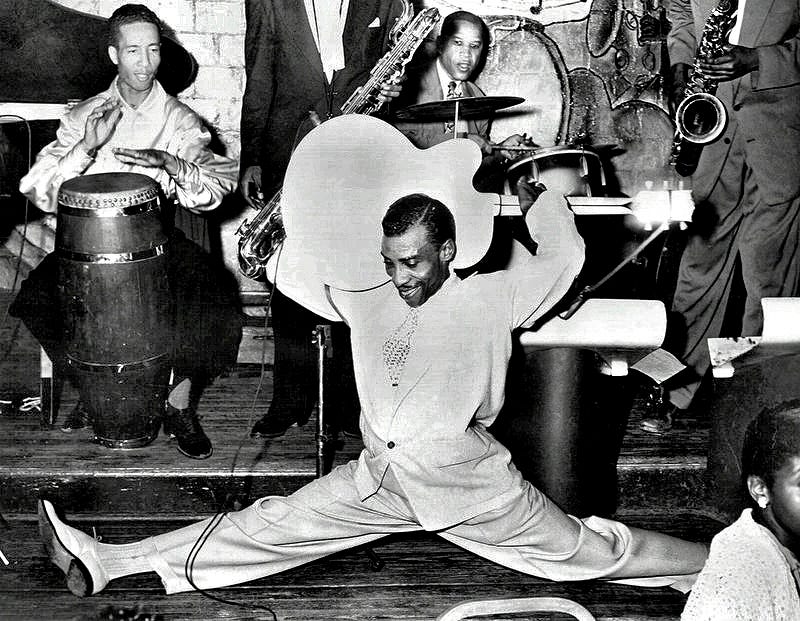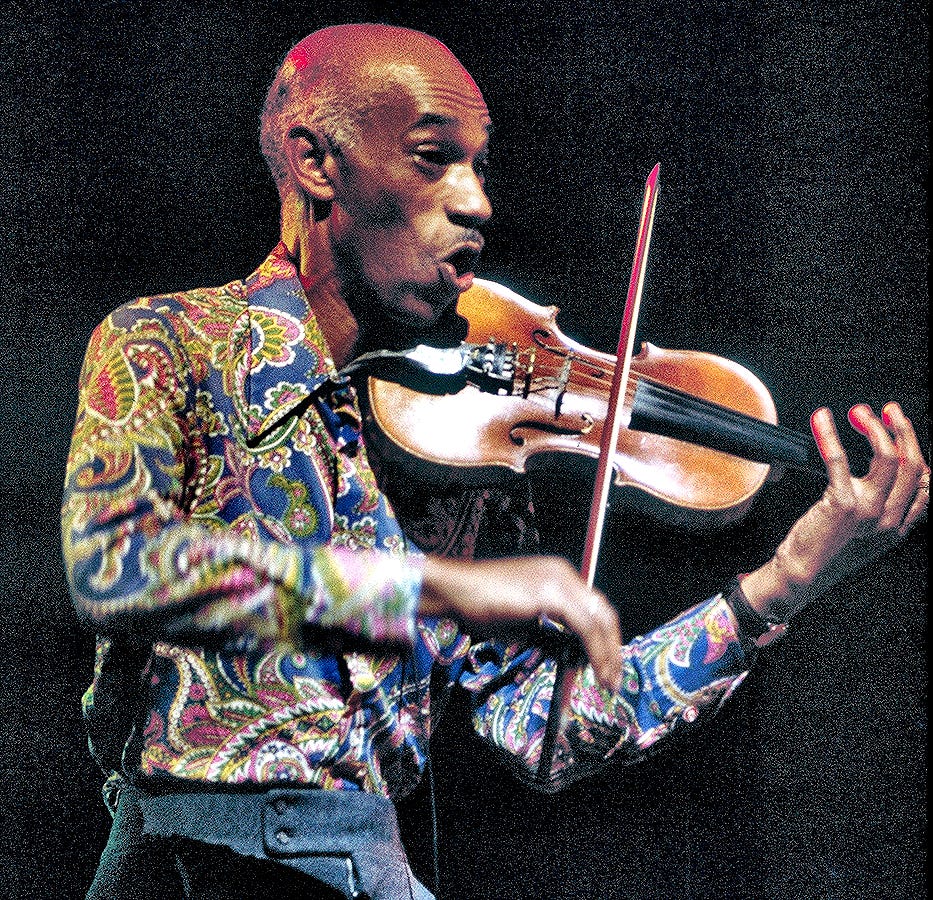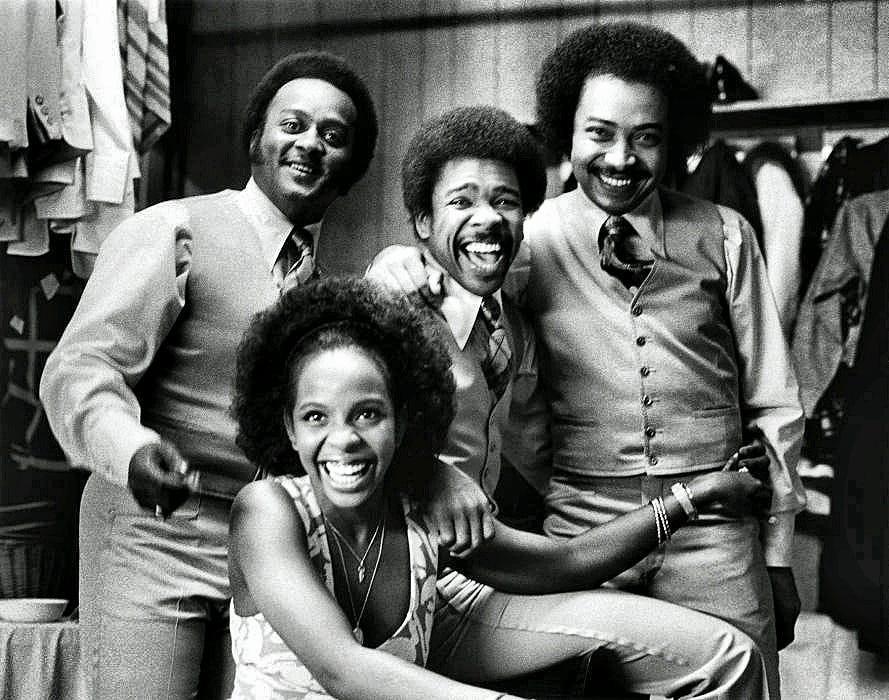T-Bone Walker, blues musician, was one of the most influential pioneers and innovators of the jump blues and electric blues sound
T-Bone Walker was born 113 years ago today.
Aaron Thibeaux "T-Bone" Walker was a critically acclaimed blues guitarist, singer, songwriter and multi-instrumentalist. He was one of the most influential pioneers and innovators of the jump blues and electric blues sound.
Born in Linden, Texas, of African-American and Cherokee descent, Walker's parents, Movelia Jimerson and Rance Walker, were both musicians. His stepfather, Marco Washington, taught him to play the guitar, ukulele, banjo, violin, mandolin and piano.
Early in the 1900s, the teenage Walker learned his craft among the street-strolling string bands of Dallas. His mother and stepfather (a member of the Dallas String Band) were musicians, and family friend, Blind Lemon Jefferson, sometimes joined the family for dinner.
Walker left school at age 10. By 15, he was a professional performer on the blues circuit. Initially, he was Jefferson's protégé and would guide him around town for his gigs. In 1929, Walker made his recording debut with a single for Columbia Records, "Wichita Falls Blues"/"Trinity River Blues," billed as Oak Cliff T-Bone.
Oak Cliff was the community he lived in at the time and T-Bone a corruption of his middle name. Pianist Douglas Fernell was his musical partner for the first recording. By age 25, Walker was working and the clubs in Los Angeles' Central Avenue, sometimes as the featured singer and guitarist with Les Hite's orchestra.
By 1942, with his second album release, Walker's new-found musical maturity and ability had advanced to the point that Rolling Stone claimed that he "shocked everyone" with his newly developed distinctive sound upon the release of his first single, "Mean Old World," on the Capitol Records label.
Much of his output was recorded from 1946–1948 on Black & White Records, including his most famous song, 1947's "Call It Stormy Monday (But Tuesday Is Just as Bad).” Other notable songs he recorded during this period were "Bobby Sox Blues" (a #3 R&B hit in 1946) and "West Side Baby" (#8 on the R&B singles charts in 1948).
Throughout his career, Walker worked with top notch musicians, including trumpeter Teddy Buckner, pianist Lloyd Glenn, Billy Hadnott (bass) and tenor saxophonist Jack McVea. From 1950-54, he recorded for Imperial Records, backed by Dave Bartholomew.
Walker's only record in the next five years was T-Bone Blues, recorded over three widely separated sessions in 1955, 1956 and 1959 and finally released by Atlantic Records in 1960. By the early 1960s, Walker's career had slowed down, in spite of a hyped appearance at the American Folk Blues Festival in 1962 with Memphis Slim and prolific writer and musician, Willie Dixon.
Yet, several critically acclaimed albums followed, such as I Want a Little Girl, recorded for Delmark Records in 1968. Walker recorded in his last years, from 1968–1975, for Robin Hemingway's Jitney Jane Songs music publishing company.
Persistent stomach woes and a 1974 stroke slowed Walker's career down to a crawl. He died of bronchial pneumonia following another stroke in March, 1975 at the age of 64.
Chuck Berry named Walker and Louis Jordan as his main influences. B.B. King cites hearing Walker's "Stormy Monday" record as his inspiration for getting an electric guitar. It was also a favorite of the Allman Brothers Band. Walker was admired by Jimi Hendrix who imitated Walker's trick of playing the guitar with his teeth. Duke Robillard is a current guitarist keeping the blues style of Walker alive.
Here, Walker performs at Jazz at the Philharmonic in the UK, 1966
On this day in 1937 — 86 years ago — the government of Germany, then under the control of Adolf Hitler of the National Socialist (Nazi) Party, formed a new state-owned automobile company, then known as Gesellschaft zur Vorbereitung des Deutschen Volkswagens mbH.
Later that year, it was renamed simply Volkswagenwerk, or "The People's Car Company." Originally operated by the German Labor Front, a Nazi organization, Volkswagen was headquartered in Wolfsburg, Germany.
In addition to his ambitious campaign to build a network of autobahns and limited access highways across Germany, Hitler's pet project was the development and mass production of an affordable yet still speedy vehicle that could sell for less than 1,000 Reich marks (about $140 at the time). To provide the design for this "people's car," Hitler called in the Austrian automotive engineer, Ferdinand Porsche.
In 1938, at a Nazi rally, the Fuhrer declared: "It is for the broad masses that this car has been built. Its purpose is to answer their transportation needs, and it is intended to give them joy." However, soon after the KdF (Kraft-durch-Freude)-Wagen ("Strength-Through-Joy" car) was displayed for the first time at the Berlin Motor Show in 1939, World War II began and Volkswagen halted production.
After the war ended, with the factory in ruins, the Allies would make Volkswagen the focus of their attempts to resuscitate the German auto industry.
Volkswagen sales in the United States were initially slower than in other parts of the world, due to the car's historic Nazi connections as well as its small size and unusual rounded shape.
In 1959, the advertising agency Doyle Dane Bernbach launched a landmark campaign, dubbing the car the "Beetle" and spinning its diminutive size as a distinct advantage to consumers. Over the next several years, VW became the top-selling auto import in the United States. In 1960, the German government sold 60 percent of Volkswagen's stock to the public, effectively denationalizing it.
Twelve years later, the Beetle surpassed the longstanding worldwide production record of 15 million vehicles, set by Ford Motor Company's legendary Model T between 1908 and 1927.
With the Beetle's design relatively unchanged since 1935, sales grew sluggish in the early 1970s. VW bounced back with the introduction of sportier models such as the Rabbit and later, the Golf.
In 1998, the company began selling the highly touted "New Beetle," while still continuing production of its predecessor. The latest Beetle continues in production today. After nearly 70 years and more than 21 million units produced, the last original Beetle rolled off the line in Puebla, Mexico, on July 30, 2003.
Thanks History.com
John Fogerty is 78 years old today.
A musician, songwriter and guitarist, Fogerty is best known for his time with the swamp rock/roots rock band, Creedence Clearwater Revival (CCR), and as a solo recording artist.
Born in Berkeley, California, Fogerty is the younger brother of the late Tom Fogerty. He attended El Cerrito High School along with the other members of CCR and took guitar lessons from Berkeley Folk Festival creator/producer, Barry Olivier.
Inspired by rock and roll pioneers, especially Little Richard and Bo Diddley, John and his brother, Tom Fogerty, joined Doug Clifford and Stu Cook in the late 1950s to form the band, Tommy Fogerty and the Blue Velvets, in El Cerrito, California.
After signing with the jazz label, Fantasy, in 1965 they became The Golliwogs and released a few singles that were largely ignored.
Fogerty was almost drafted in 1966, instead joining an Army Reserve unit. He served at Fort Bragg, Fort Knox and Fort Lee. He was discharged from the Army in July, 1967. In the same year, the band changed its name to Creedence Clearwater Revival.
At this time, he took his brother's place as lead singer for the band. By 1968, things started to pick up for the band. The band released their eponymous debut album and also had their first hit single, "Susie Q". Many other hit singles and albums followed, beginning with "Proud Mary" and the album Bayou Country.
John Fogerty, as writer of the songs for the band (as well as lead singer and lead guitarist), felt that his musical opinions should count for more than those of the others, leading to resentments within the band. These internal rifts, and Tom's feeling that he was being taken for granted, caused Tom to leave the group in January, 1971.
The two other group members, bassist Stu Cook and drummer Doug Clifford, wanted a greater role in the band's future. Fogerty, in an attempt to keep things together, insisted Cook and Clifford share equal songwriting and vocal time on the band's final album, Mardi Gras, released in April, 1972.
This album included the band's last two singles, the 1971 hit "Sweet Hitch-Hiker" and "Someday Never Comes," which barely made it into the Billboard Top 20.
Cook and Clifford told Fogerty that the fans would not accept "Mardi Gras" as a CCR LP, but he said, "My voice is a unique instrument and I will not lend it to your songs." He gave them an ultimatum: either they would do it or he would quit immediately. They accepted his ultimatum, but the album received poor reviews.
It was a commercial success, however, peaking at #12 and achieving gold record status. It generated weaker sales than their previous albums. The group disbanded shortly afterwards. The only reunion with all four original members would be at Tom Fogerty's wedding in 1980.
John, Doug and Stu played a 45 minute set at their 20th class reunion in 1983, and John and Doug would reunite again for a brief set at their 25th class reunion in 1988.
John Fogerty began a solo career, originally under the name, The Blue Ridge Rangers, for his 1973 LP debut. Fogerty played all of the instruments on covers of others' country music hits, such as "Jambalaya" (which was a Top 20 hit).
After performing country and western tunes, he released a rock single in late 1973, also as The Blue Ridge Rangers. The two John Fogerty penned songs were "You Don't Owe Me" and "Back in the Hills" (Fantasy F-710). In early 1974, Fogerty released two rock tunes on a seven-inch single. The two songs were the vocal "Comin' Down The Road" b/w the instrumental "Ricochet."
His second solo album, John Fogerty, was released in 1975. Sales were slim and legal problems delayed a followup, though it yielded "Rockin' All Over the World," a Top 40 hit for Fogerty in North America.
Fogerty's solo career re-emerged in full force with 1985's Centerfield, his first album for Warner Bros. Records (which took over co-ownership of Asylum's contract with Fogerty). Centerfield went to the top of the charts and included a Top 10 hit, "The Old Man Down The Road." The title track is frequently played on classic rock radio and at baseball games to this day. But that album was not without its legal snags.
Two songs on the album, "Zanz Kant Danz" and "Mr. Greed," were believed to be attacks on Fogerty's former boss at Fantasy Records, Saul Zaentz. "Zanz Kant Danz" was about a pig who can't dance, but would "steal your money."
When Zaentz responded with a lawsuit, Fogerty issued a revised version of "Zanz Kant Danz" (changing the lead character's name to Vanz). Another lawsuit (Fantasy, Inc. v. Fogerty) claimed that "The Old Man Down The Road" shared the same chorus as "Run Through the Jungle" (a song from Fogerty's days with Creedence to which Fantasy Records had owned the publishing rights).
Fogerty ultimately won his case when he proved that the two songs were wholly distinct compositions. Fogerty then countersued for attorney fees (Fogerty v. Fantasy). After losing in the Ninth Circuit Court of Appeals, Fogerty won his case in the U.S. Supreme Court, which ruled the trial court has discretion in awarding fees to defendants or plaintiffs.
In 1990, Tom Fogerty died of AIDS (specifically from a tuberculosis infection) at the age of 48, having contracted HIV from blood transfusions for back ailments.
John Fogerty has mentioned that the darkest moments in his life were when his brother took the record company's side in their royalties dispute, and the fact that when his brother died, the two of them were not speaking to each other.
Fogerty traveled to Mississippi in 1990 for inspiration and visited the gravesite of blues legend, Robert Johnson. There he realized that Robert Johnson was the true spiritual owner of his own songs, no matter what businessman owned the rights to them. It was then that Fogerty decided to start making a new album and to perform his old Creedence material regularly in concert.
It was at this time visiting the Mt. Zion Missionary Baptist Church cemetery that Fogerty met Skip Henderson, a New Jersey vintage guitar dealer who had formed a nonprofit corporation, The Mt. Zion Memorial Fund, to honor Johnson with a memorial marker.
Fogerty subsequently funded headstones for Charlie Patton, James Son Thomas, Mississippi Joe Callicott, Eugene Powell, Lonnie Pitchford and helped with financial arrangements for numerous others.
Here, Fogerty performs “Proud Mary” at Farm Aid, 1997
Jerry Douglas
Photo by Frank Beacham
Jerry Douglas is 67 years old today.
Douglas is a renowned resonator guitar and lap steel player and record producer. In addition to his thirteen solo recordings, Douglas has played on more than 1,600 albums.
As a sideman, he has recorded with artists as diverse as Ray Charles, Eric Clapton, Phish, Dolly Parton, Paul Simon, Mumford & Sons, Keb' Mo', Ricky Skaggs, Elvis Costello and Johnny Mathis, as well as performing on the O Brother, Where Art Thou? soundtrack. He has been part of such notable groups as The Whites, New South, The Country Gentlemen, Strength in Numbers and Elvis Costello's "Sugar Canes."
As a producer, he has overseen albums by Alison Krauss, the Del McCoury Band, Maura O'Connell, Jesse Winchester and the Nashville Bluegrass Band. Along with Aly Bain, he serves as Music Director of the popular BBC Television series, "Transatlantic Sessions."
Since 1998, Douglas has been a member of Alison Krauss and Union Station, touring extensively and playing on a series of platinum-selling albums. When not on the road with Krauss, Douglas tours with his band in support of his extensive body of work.
Douglas lives in Nashville with his wife, Jill. The couple have four children.
Here, Douglas performs “Little Medley”
Papa John Creach was born 106 years ago today.
Creach was a blues violinist who played for Jefferson Airplane (1970–1975), Hot Tuna, Jefferson Starship, Jefferson Starship — The Next Generation, the San Francisco All-Stars (1979–1984), The Dinosaurs (1982–1989) and Steve Taylor. Creach was also a frequent guest at Grateful Dead concerts.
Born at Beaver Falls, Pennsylvania, Creach began playing violin in Chicago bars when his family moved there in 1935, and later joined a local cabaret band, the Chocolate Music Bars, and toured the Midwest with them.
Moving to Los Angeles in 1945, he played in the Chi Chi Club, spent time working on an ocean liner, appeared in several films and performed as a duo with Nina Russell.
In 1967, Creach met and befriended drummer, Joey Covington. When Covington joined the Jefferson Airplane in 1970, he introduced them to Creach, who was invited to join Hot Tuna. Although regarded as a session musician, he would remain with the band for the next four years, before leaving in 1974 to join Jefferson Starship and record on their first album, Dragonfly. Creach toured with Jefferson Starship and played on the band's hit album, Red Octopus, in 1975.
Around 1976, Creach left to pursue a solo career. Despite this, he was a guest musician on the spring 1978 Jefferson Starship tour. A year later, Creach renewed his working relationship with Covington as a member of the San Francisco All-Stars, as well as with Covington's Airplane predecessor, Spencer Dryden, as a member of The Dinosaurs.
He also continued with occasional guest appearances with Hot Tuna, and was on stage at the Fillmore Auditorium in 1988 when Jack Casady and Jorma Kaukonen of Hot Tuna were reunited with Paul Kantner and Grace Slick for the first time since Jefferson Airplane disbanded.
In 1992, he became one of the original members of Jefferson Starship — The Next Generation and performed with them until suffering a heart attack during the 1994 Northridge earthquake on January 17, 1994.
As a consequence of the heart attack, Creach contracted pneumonia, from which he died a month later at the age of 76. Jefferson Starship performed a benefit concert to raise money for his family after his death and released tracks from their performances as the album Deep Space/Virgin Sky.
Here, Creach and Hot Tuna perform “Papa John's Down Home Blues” in 1988 at the Fillmore
Gladys Knight is 79 years old today
.
Known as the "Empress of Soul," Knight is a singer-songwriter, actress, businesswoman, humanitarian and author. She is best known for the hits she recorded during the 1960s and 1970s, for both the Motown and Buddah Records labels, with her group, Gladys Knight & the Pips.
The most famous incarnation of “The Pips” also included her brother, Merald "Bubba" Knight, and her cousins, Edward Patten and William Guest.
Born in Oglethorpe, Georgia, Knight first achieved minor fame by winning Ted Mack's Original Amateur Hour TV show contest at the age of seven in 1952. The following year, she, her brother Merald, sister Brenda and cousins William and Elenor Guest formed a musical group called The Pips (named after another cousin, James "Pip" Woods).
By the end of the decade, the act had begun to tour, and had replaced Brenda Knight and Eleanor Guest with Gladys Knight's cousin, Edward Patten, and a friend. Gladys Knight & the Pips joined the Motown roster in 1966, and, although regarded as a second-string act, scored several hit singles.
They included "I Heard It Through the Grapevine" (recorded first by Marvin Gaye but released a year later), "Friendship Train" (1969), "If I Were Your Woman" (1970), "I Don't Want To Do Wrong" (1971), "Neither One of Us (Wants to Be the First to Say Goodbye)" (1972) and "Daddy Could Swear (I Declare)" (1973).
In their early Motown career, Gladys Knight and the Pips toured as the opening act for Diana Ross and The Supremes. Gladys Knight stated in her memoirs that Ross kicked her off the tour because the audience's reception to Knight's soulful performance overshadowed her. Berry Gordy later told Gladys that she was giving his act a hard time.
The act left Motown for a better deal with Buddah Records in 1973, and achieved full-fledged success that year with hits such as the "Midnight Train to Georgia" (#1 on the pop and R&B chart), "I've Got to Use My Imagination" and "You're the Best Thing That Ever Happened to Me."
In the summer of 1974, Knight and the Pips recorded the soundtrack to the successful film, Claudine, with producer Curtis Mayfield. The act was particularly successful in Europe, and especially the United Kingdom.
However, a number of the Buddah singles became hits in the UK long after their success in the U.S. For example, "Midnight Train to Georgia" hit the UK pop charts Top 5 in the summer of 1976, a full three years after its success in the U.S.
During this period of greater recognition, Knight made her motion picture acting debut in the film, Pipe Dreams, a romantic drama set in Alaska.
Knight and the Pips continued to have hits until the late 1970s, when they were forced to record separately due to legal issues, resulting in Knight's first solo LP recordings — Miss Gladys Knight (1978) on Buddah and Gladys Knight (1979) on Columbia Records.
Signing with Columbia Records in 1980 and restored to its familiar quartet form, Gladys Knight & the Pips began releasing new material. The act enlisted former Motown producers, Nickolas Ashford and Valerie Simpson, for their first two LPs — About Love (1980) and Touch (1981). During this period, Knight kicked a gambling addiction to the game baccarat.
In 1987, Knight decided to pursue a solo career, and she and the Pips recorded their final LP together, All Our Love (1987), for MCA Records. Its lead single, "Love Overboard," was a hit. After a successful 1988 tour, the Pips retired and Knight began her solo career.
Here, Knight and the Pips perform “Midnight Train to Georgia”









